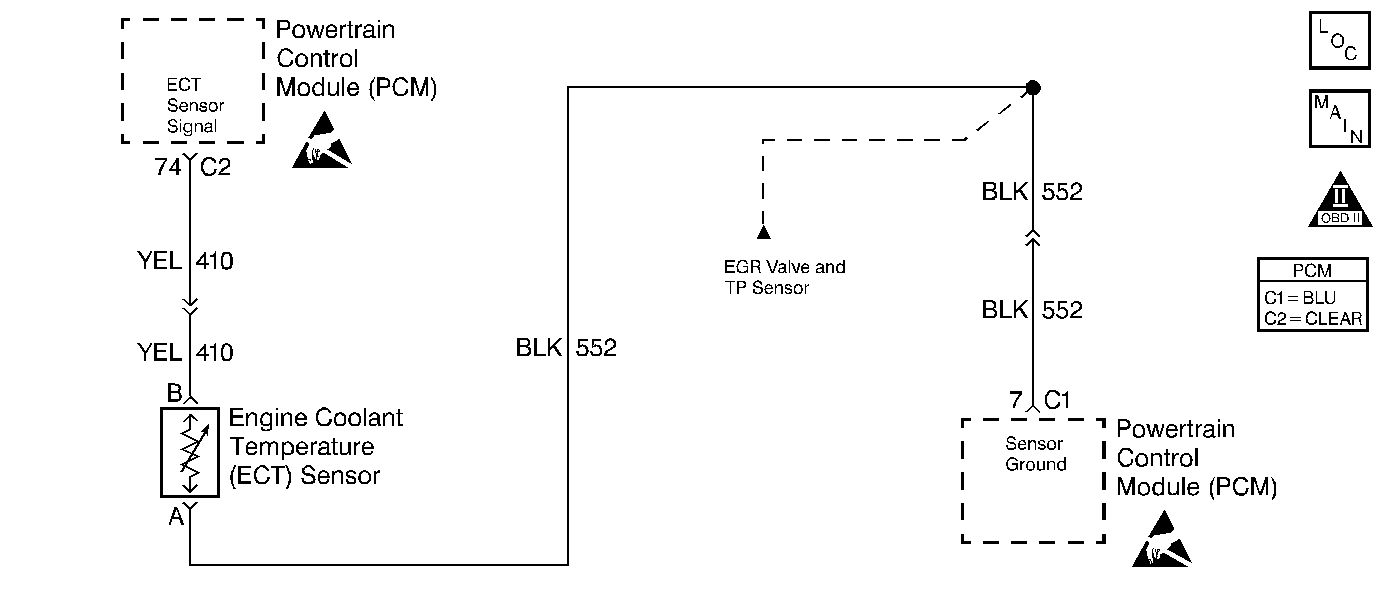
Circuit Description
The Engine Coolant Temperature sensor is a thermistor, a sensor whose resistance varies with temperature. The ECT sensor signal is on CKT 410 and sensor ground on CKT 808. As the temperature increases, sensor resistance decreases. Low coolant temperature will result in high signal voltage on CKT 410. DTC P0118 sets because the coolant temperature cannot be less than -38°C (-36°F) when IAT is greater than -5°C (23°F) or the engine has been running long enough too warm above -38°C (-36°F).
Conditions for Running the DTC
| • | DTCs P0112 and P0113 not set. |
| • | IAT sensor value -5°C (23°F) or greater. |
| • | DTCs P0122 and P0123 not set. |
| • | Engine running with throttle angle 7 degrees or greater for at least 3.5 minutes. |
Conditions for Setting the DTC
The ECT sensor reading is -38°C (-36°F) or lower when one of the above sets of test conditions have been met.
Action Taken When the DTC Sets
| • | PCM uses the transaxle temperature sensor values in place of the engine coolant temperature sensor for the first 4.25 minutes of engine operation, and a value of 90°C (194°F) afterwards. |
| • | Transaxle shift adapts are maintained at current levels. |
| • | The PCM will illuminate the Malfunction Indicator Lamp (MIL) when the diagnostic runs and fails. |
| • | The PCM will record operating conditions at the time the diagnostic fails. This information will be stored in the Freeze Frame and Failure Records. |
Conditions for Clearing the MIL/DTC
| • | The PCM will turn the MIL OFF after three consecutive drive trips that the diagnostic runs and does not fail. |
| • | A Last Test Failed (current) DTC will clear when the diagnostic runs and does not fail. |
| • | A History DTC will clear after forty consecutive warm-up cycles with no failures of any emission related diagnostic test. |
| • | Use a scan tool to clear DTCs. |
| • | Interrupting PCM battery voltage may or may not clear DTCs. This practice is not recommended. Refer to Clearing Diagnostic Trouble Codes in Powertrain Control Module Description . |
Diagnostic Aids
If fault is not present perform Powertrain Ground Check and also review Failure Rec. to determine conditions under which and how long ago the DTC set.
Test Description
The numbers below refer to the step numbers on the Diagnostic Table.
-
Checking for an open in the ECT sensor signal Circuit from PCM to sensor. If the display shows 135°C (275°F) to 151°C (304°F) with the coolant temperature sensor wiring harness terminals jumpered together, then the ECT sensor signal circuit and the ECT sensor ground circuit are OK.
-
Checking for an open in the ECT sensor ground circuit. If shorting the ECT sensor signal circuit to ground causes ECT display to show 135°C (275°F) to 151°C (304°F), then there is an open in the ECT sensor ground circuit.
Step | Action | Value(s) | Yes | No |
|---|---|---|---|---|
1 | Did you perform the Powertrain On-Board Diagnostic (OBD) System Check? | -- | Go to Step 2 | |
2 |
Is the temperature the same or less than the value specified? | -35°C (-31°F) | Go to Step 3 | Fault not present. Refer to Diagnostic Aids |
Is the temperature more than the value specified? | 135°C (275°F) | Go to Step 9 | Go to Step 4 | |
Connect jumper from ECT sensor signal terminal (harness side) to ground. Is the temperature more than the value specified? | 135°C (275°F) | Go to Step 6 | Go to Step 5 | |
5 |
Is the resistance the same or less than the value specified? | 5 ohms | Go to Step 11 | Go to Step 7 |
6 |
Is the resistance the same or less than the value specified? | 5 ohms | Go to Step 11 | Go to Step 8 |
7 | Repair the open in the ECT sensor signal circuit. Is the repair complete? | -- | Go to Powertrain Control Module Diagnosis for Verify Repair | -- |
8 | Repair the open in the ECT sensor ground circuit. Is the repair complete? | -- | Go to Powertrain Control Module Diagnosis for Verify Repair | -- |
9 |
Was terminal contact repaired? | -- | Go to Powertrain Control Module Diagnosis for Verify Repair | Go to Step 10 |
10 | Replace the ECT sensor. Refer to Engine Coolant Temperature Sensor Replacement . Is the replacement complete? | -- | Go to Powertrain Control Module Diagnosis for Verify Repair | -- |
11 |
Was terminal contact repaired? | -- | Go to Powertrain Control Module Diagnosis for Verify Repair | Go to Step 12 |
12 | Replace the PCM. Refer to Powertrain Control Module Replacement/Programming . Is the replacement complete? | -- | Go to Powertrain Control Module Diagnosis for Verify Repair | -- |
